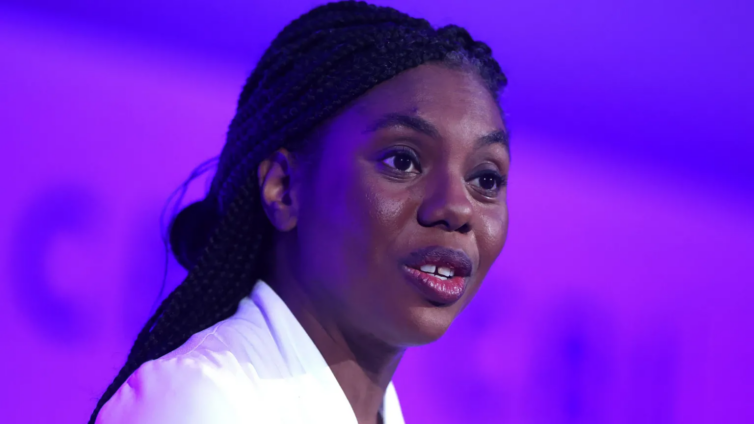Kemi Badenoch has stood by her past comments about Nigeria after the vice president of the West African country accused her of denigrating it.
The Conservative Party leader, who was born in the UK but mostly raised in Nigeria, has repeatedly described growing up in fear and insecurity in a country plagued by corruption.
On Monday, Nigerian Vice-President Kashim Shettima suggested Badenoch could "remove the Kemi from her name" if she was not proud of her "nation of origin".
Asked about Shettima's comments, Badenoch's spokesman said she "stands by what she says" and "is not the PR for Nigeria".
"She is the leader of the opposition and she is very proud of her leadership of the opposition in this country," he told reporters.
"She tells the truth. She tells it like it is. She is not going to couch her words."
During a speech on migration in Nigerian capital Abuja, Shettima said his government was "proud" of Badenoch "in spite of her efforts at denigrating her nation of origin."
Shettima was met with applause when he said: "She is entitled to her own opinions; she has even every right to remove the Kemi from her name but that does not underscore the fact that the greatest black nation on earth is the nation called Nigeria."
He compared Badenoch's approach to that of her predecessor, Rishi Sunak - the UK's first prime minister of Indian heritage - as "a brilliant young man" who "never denigrated his nation of ancestry".
It is unclear which comments Shettima was referring to, but Badenoch has frequently mentioned her Nigerian upbringing in speeches and interviews.
Born Olukemi Adegoke in Wimbledon in 1980, she grew up in Lagos, Nigeria, and in the United States where her physiology professor mother lectured.
She returned to the UK at the age of 16 to live with a friend of her mother because of the worsening political and economic situation in Nigeria, and to study for her A-levels.
After marrying Scottish banker Hamish Badenoch, she took her husband's surname.
At the Conservative Party conference this year, Badenoch contrasted the freedoms she experienced in the UK to her childhood in Lagos "where fear was everywhere".
She vividly described the city as lawless, recalling hearing "neighbours scream as they are being burgled and beaten - and wondering if your home will be next".
Last week during a tour of the US, she described her home city as "a place where almost everything seemed broken".
Her experiences helped shape her conservative ideals and set her against socialism, she said.
Latest Stories
-
Ex NYC Governor Andrew Cuomo under investigation for Covid testimony
15 minutes -
OKESS firearm case: Student, stepfather granted GH¢80,000 bail
27 minutes -
Ghana throws open its doors with visa processing slashed to 5 days in dramatic policy reset
41 minutes -
Italy tightens rules for Italian descendants to become citizens
60 minutes -
Trump ambushes S African leader with claim of Afrikaners being ‘persecuted’
1 hour -
Judge says US deportations to South Sudan violate court order
1 hour -
US accepts gifted Qatari plane to join Air Force One fleet
2 hours -
Tottenham beat Man Utd to win Europa League & end 17-year wait for trophy
2 hours -
Clear and strong climate policies are antidote to economic uncertainty – UN Climate Chief
2 hours -
Journalism has become politicised and cheap – KSM laments
2 hours -
Climate Education reaches differently-abled children at Garden City Special School
2 hours -
Mahama’s remarks on Cedi vindicate NPP’s economic legacy – Minority
2 hours -
I lied about having radio experience to get hired – KSM
3 hours -
NLC direct University Senior Staff Association to call off strike
3 hours -
Shelters in crisis: Calls grow for gov’t support as caregivers struggle to protect vulnerable children
3 hours

